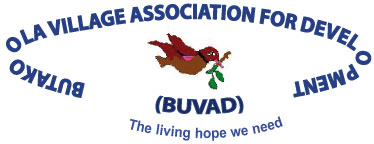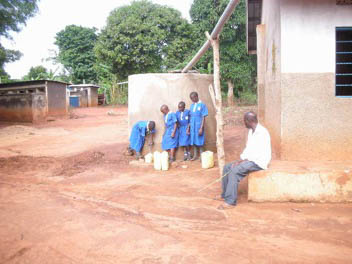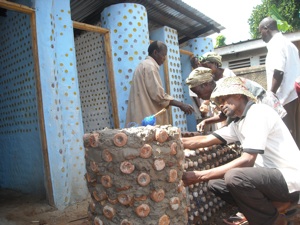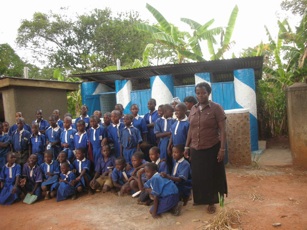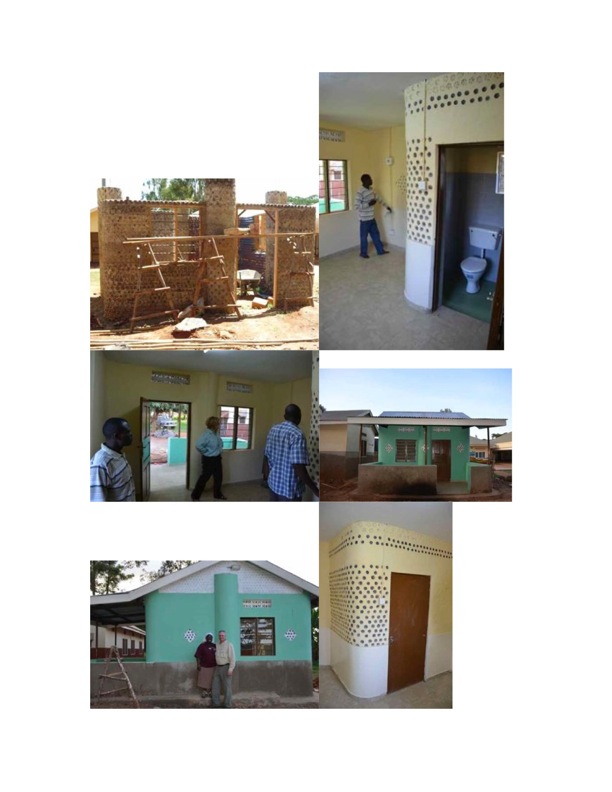Projects Overview:
BUVAD continues with its ambition to uphold the set Millennium Development Goals. As we continue to pursue this noble cause more and more challenges emerge that in due course prompt slight alterations of our laid down project objectives, though prudently in order to address humanitarian concerns within our focal communities. With this concerted effort, BUVAD has found itself emerging among the lead small but result oriented non-profits, doing commendable work for humanitarian causes in our focal areas of Kayunga District.
BUVAD currently implements the following projects:
- The Rural Safe Water Supply Project (RSWSP) in Kayunga District.
- The Orphaned Vulnerable Children Care and Support Project.
- The community sunflower growing for Poverty Eradication through Cooking Extraction project.
- The Women Empowerment Project through “ Get Together Women Development Initiative” Group.
- The Bottle Brick technology for improved waste management, environmental/nature conservation and climate change issues resilience Project-Using waste Plastic bottles to build Rain-water harvesting tanks, Toilets and other structures.
Many thanks to all our supporters and donors whom have enabled us to effectively implement our project activities and covering our administrative costs.
Its by your support that BUVAD has managed to cover its overall administrative costs. We appreciate every little support to us its very valuable. Please be intrigued to support again! You can make tax deductible donations by clicking on the donate button.
The Rural Safe Water Supply Project
Water and Sanitation
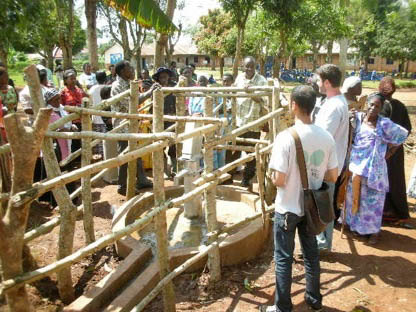
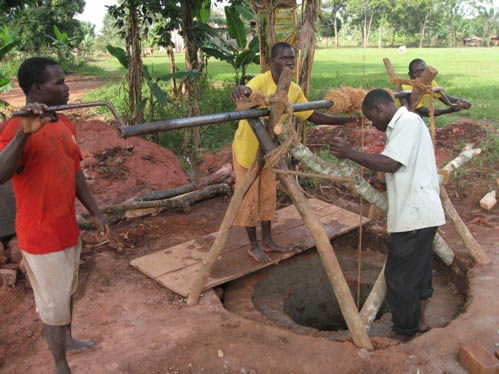
BUVAD with partner support from Minga Foundation, StartFund Netherlands, the Kayunga District Water Office and local contribution from beneficiary communities, has by far been able to set up 9 f the 72 targeted hand dug water wells, sometimes referred to as shallow wells, though deep enough to near machine drilled borehole wells (between 30 to 80 feet deep depending on the terrain of the site) installed with a borehole hand pump in the villages of Butakoola, Bwetyaaba, Gaaza and Kyambogo Villages in Kayunga Sub County of Kayunga District.
These kinds of water wells are much cheaper as compared to the mechanized borehole system set-up and likewise quite maintainable by the community themselves making our program approach very sustainable.
According to a recent Monitoring and Evaluation (ME) conducted, about 1735 direct beneficiaries in 182 homes and an infant school complex, have so far been saved the challenge of easy access to safe water supply. It is our dream that by the year 2018 we shall have set up 63 more of this kind making a total of 72 highland hand-dug water wells installed with boreholes in undeserved regions of Kayunga District.
WASH Education:
We target to intensify sensitizations in water, sanitation and hygiene (WASH) for improved health standards. By far, we have trained 9 water user communities,also helped them to set up 9 water user management committees for each safe water supply source for sustainable management and they are moving on wonderfully well. These committees have set up a follow up forum, holding quarterly re-unions annually under BUVAD supervision, on water sources functionality and impact through which they share learning experience, share information updates, plan way forwards and hold meetings on a quarterly basis. They have an appointed secretary and are in the process of designing governing by-laws guided by BUVAD , the District and County water office together with the project’s stake holders for legal recognition of their significance.
Project Mechanics:
BUVAD has trained its Safe Water Supply project hand pump mechanic whom has been fully equipped with a tool box from Work Aid UK. BUVAD hopes to train more hand pump mechanics. The mechanics help with prompt borehole maintenance support to our project beneficiary communities and shall also beef up our project team during the implementation process in future.
Important to note on Findings About the WASH Situation!
In August 2015, BUVAD conducted a Monitoring and Evaluation survey in both its beneficiary areas and sample project target areas in Kayunga District. Through this survey, it was discovered that for the larger area of the yet to be covered area by the BUVAD RSWSP, estimated to be a fraction of 60% of the whole District;
There was an abundant need for set up of a lot more BUVAD type of safe water supply wells, construction of Standard Toilets for households and school complexes, intensive facilitation and campaigning for hand washing with soap and general intensification of Water, Hygiene and Sanitation trainings within both rural ad urban areas of whole of Kayunga District.
In Kayunga nearly 20 people are admitted to the District Hospital per week suffering from water related diseases like; malaria, typhoid, bilharzia or dysentery. At least 4 out of each of these may end up dying having delayed in their homes administering the rudimentary self treatment on herbs and other witch beliefs. In oral interviews during the survey, most respondents in this area mistook all these diseases to be generally Malaria, while others had no description.
Below is a photo and info about a sample water well serving communities near Kyambogo and Nawandagala villages in Kayunga Sub County.
Click on video Link below to Watch this video about;
" Water a Health Challenge in Kayunga!"https://www.youtube.com/watch?v=uzwSBh_kzS8&feature=youtu.be
This water well is a link to the salty saline Kyampisi – Kayunga swamp stretch, an isolated thick bushy area located far away from the households. The water at this water well is brownish in color. Collection is by stepping in and is being shared by people and animals.
This is typical of most water sources in the area and survey shows that most of the existent water sources have a characteristic of location in isolated thick bushy areas located far away from the households.
The water has a bad odour/smell, a rotten eggs like smell coming from it,. This is a sign of decomposing waste and plant material in it. The water is hard, salty and corrosive. Its a pool with a collection of eroded water and naughty community children sometimes use these pools as play swimming pools. Some of these ignorant little ones end up drowning in these pools! There is a clear sign of thriving water born diseases like bilharzias, typhoid, dysentery etc within these water sources as some worms and other unidentifiable organisms can be seen dangling in the water.
The water cannot be used to wash bright coloured clothes lest they get stained with colours. If the water is used to prepare food the food develops a weird appearance. For example Posho(mingled maize flour) food when ready is always white in colour but this water instead turns it brownish making the food look not worthy for eating though its always eaten!
On the social response, the rampant married couple fights and women rape cases in the area have close correlation with women fetching water from distant isolated areas.
Likewise, even little children have suffered drowning accidents being the key family water fetchers and sometimes fall prey to child kid napping and sacrifice by ritualistic fellows, whom sacrifice them for stupid ritual purposes. As these little ones go to fetch water from distant isolated areas, this provides the child hunters fertile ground for catching their prey.
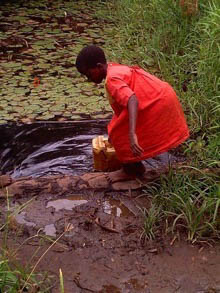
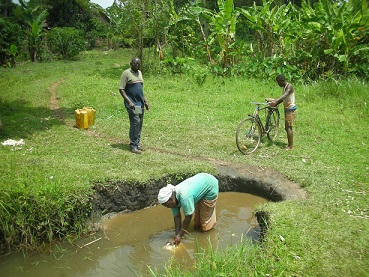
Project Funding:
For the successful implementation of this project BUVAD needs your support to successfully save lives. We are looking for a victory over this.
We are welcoming new funding organizations from all over the world.
Individual donors, funders and corporate givers are welcome indiscriminatingly.
How You Can Help:
You can support by clicking on the donate button you see on our website . Alternatively do not hesitate to get in touch with us via our email: address buvad2000@gmail.com for further details and supporting a project activity of your choice or volunteering to help . In case you require a detailed project proposal, we will submit one. In case you choose to make a direct transfer to our bank account, we will provide the organization banking details.
In case you require a tax deduction receipt we shall guide you to our fiscal sponsors to make the donation.
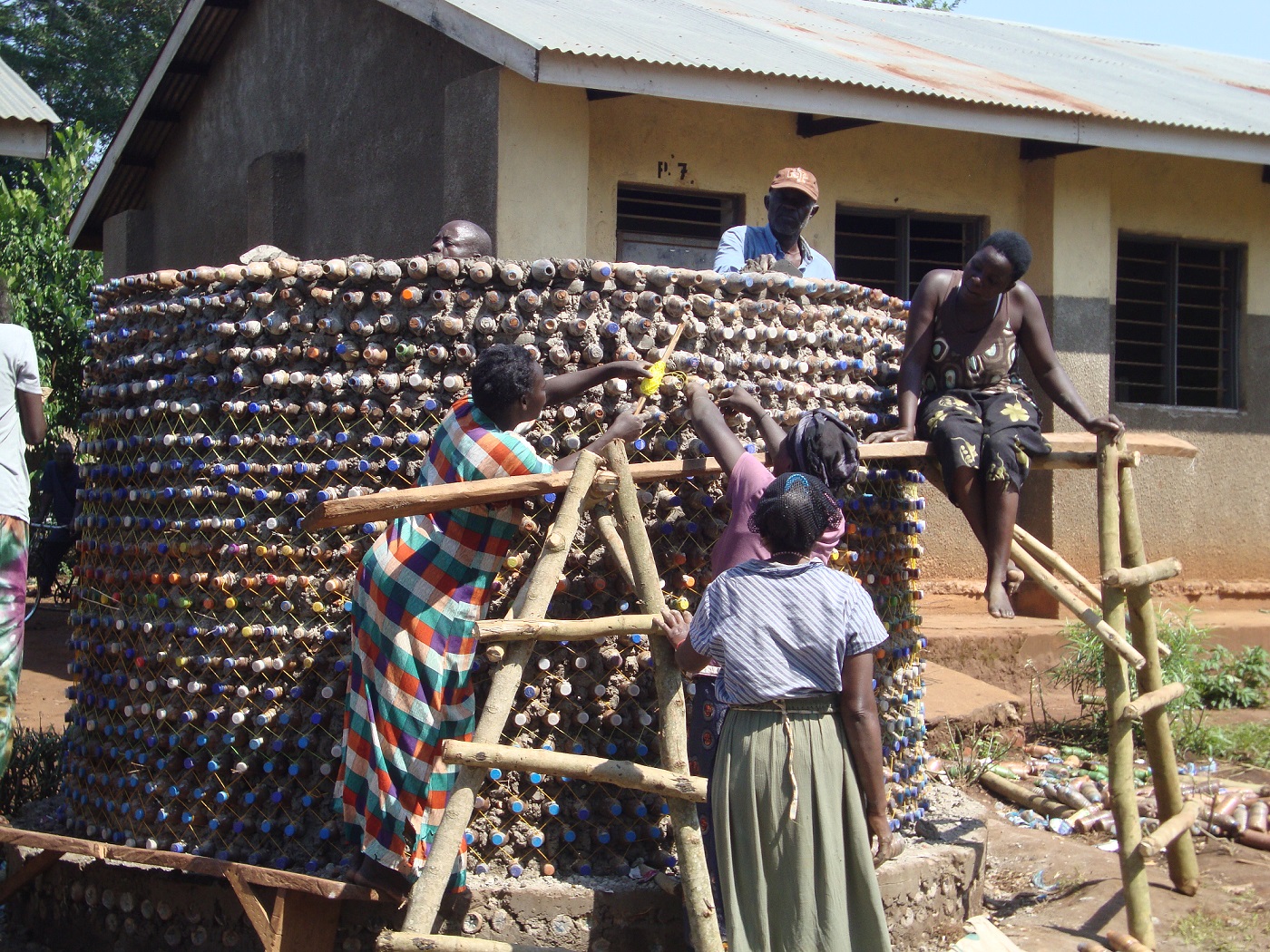 The Environmental and Nature Conservation Project
The Environmental and Nature Conservation Project
Innovations to Control Waste Plastic Bottles' Accumulation:
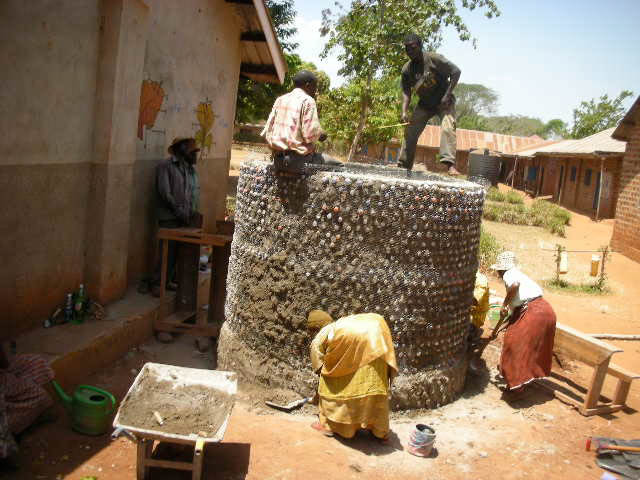
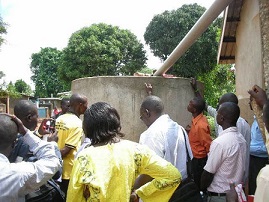 BUVAD has come up with an innovative approach to help Ugandans eliminate the environmental hazard of accumulating waste plastic bottles without burning, while using them profitably to harvest rainwater in rural areas, substituting mud bricks that require cutting trees to bake them. Furthering this innovative technology of affordable waste plastic bottle bricks-water harvesting tanks construction and other local innovations;
BUVAD has come up with an innovative approach to help Ugandans eliminate the environmental hazard of accumulating waste plastic bottles without burning, while using them profitably to harvest rainwater in rural areas, substituting mud bricks that require cutting trees to bake them. Furthering this innovative technology of affordable waste plastic bottle bricks-water harvesting tanks construction and other local innovations;
BUVAD is intending to set up a local-indigenous innovations promotion centre with all structures at this centre constructed using bottle bricks.
BUVAD also intends to conduct extensive training workshops on bottle brick water harvesting tanks construction for at least 50 parents at 20 selected community primary schools in Kayunga District of Uganda, followed by creation of trainees' community chains - water tanks construction cooperatives. With BUVAD subsidy the group/s will go constructing for each member.
Below is the water harvesting tank constructed using waste plastic bottles as bricks serving 670 pupils at Bwetyaaba Primary School in Kayunga Sub County of Kayunga District.
Carbon Offset /Justification
BUVAD uses a technology of self-motivating plastic bottle end users towards constructive waste plastic bottle management. BUVAD trains them to re-use waste plastic bottles as bricks in constructing water harvesting tanks. This helps beneficiary communities diver from the waste plastic bottles burning approach that releases toxic fumes, towards total withdraw from the environment while turning them into a utility, minimizing on tree cutting, discouraging burning of trees to bake mud bricks, exercises that have been accumulating carbon emissions. A reduction in waste plastic bottles accumulation will reduce on carbon emissions creating carbon credits.
About 6 kg of carbon dioxide is created during production and incineration of plastic bottles. Annually, about (30 X 359,153) 10,774, 590 beverage bottles are consumed and burnt off in Kayunga region of Uganda. Hence 6 X10,774,590 = 64, 647,540kgs approximately 65,000tonnes (above) of carbon offset will be through this project annually .
Climate Change Adaptation
The waste plastics bottle brick technology helps to raise communities' awareness towards the need to enthusiastically reduce on carbon emissions, reduce on waste plastic bottles accumulation, developing more innovative approaches towards climate change resilience.
The project through the conducted training workshops revives community awareness towards the need for re-forestation for an improvement on rainfall reliability, ecological balance and Agriculture.
The project helps the communities get to know other possible causes of the climate changes challenges and think out possible solutions/innovations.
Climatic effect(s) Adopted to by The waste plastics bottle brick technology
The innovation adopts to the following climatic change effects;
- High Carbon emissions/pollution
- Agricultural seasonal imbalances
- Water scarcity
- Global warming/Over heating
- Soil suffocation
This innovation has the potential to help the whole country in taming the waste plastic PET bottles accumulation, which has been identified as a big challenge towards soil conservation and blockage of drainage channels in major towns and the City. The innovation going to help in the eradication of waste plastic PET bottles that suffocate the soil to reduce soil fertility from the environment, especially that of the Ugandan Agro-based economy.
The waste plastic - bottle brick building has stronger walls than those of the mud brick house hence an immediate substitute to mud bricks, making bottle bricks doesn't require cutting down trees to burn them like it is with mud bricks hence will reduce on the rate of tree cutting.
In Uganda nearly 8,000,000 PET bottles are being produced monthly to pack mineral water that is consumed by many Ugandans as a quick solution to safe drinking water. Most of these PET bottles end up being littered carelessly, ending up in farmers’ gardens, water channels, rivers and lakes.
This as identified above poses a great threat to the environment as has been identified by BUVAD in Kayunga District.
We are planning to continue conducting similar training workshops about constructing a rain water harvesting tank using waste plastic bottles to; adults, youths and children of Kayunga District and Uganda as a whole.
However all this will be possible as a result of the joint efforts and donations from partners like you.
By so doing, the rate of tree cutting will be reduced as making bricks out of bottles doesn't require baking / burning like it has been the case with mud bricks.
When tree cutting reduces this will improve on rainfall reliability, environmental conservation and climatic conditions of Kayunga District, Uganda and Africa as a whole.
Also, the blocked channels in Kayunga Town, other Ugandan major towns and Kampala city, which have always caused flooding, shall no longer be blocked by these waste bottles as now they are being turned into a utility other than a hazard.
We also wish to disseminate this technology to the rest of the country. We invite you to visit this project at Bwetyaaba Primary School in order to have an opportunity to see this marvellous 6000ltrs rain-water harvesting tank that was constructed out of Waste plastic PET bottles.
Also, we have been able to construct other strong useful structures like; toilets, house and huts using bottle bricks.
See pohtos below;
Click on video Link belowto Watch the following video to learn more:
https://www.youtube.com/watch?v=wbY_e2Xs5OI&feature=youtu.be
How You Can Support:
Your funding support is most desired for the success of our project. We welcome individual donations, coop orate givers and donor organizations' grants. You can generously donate to promote our work by clicking the donate button or by directly contacting us at the contact page for us to send you any additional transfer details. We remain eager for your support.
The Sunflower Growing For Poverty Eradication Through The Cooking Oil Extraction Project
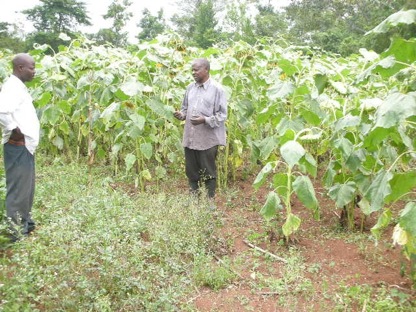
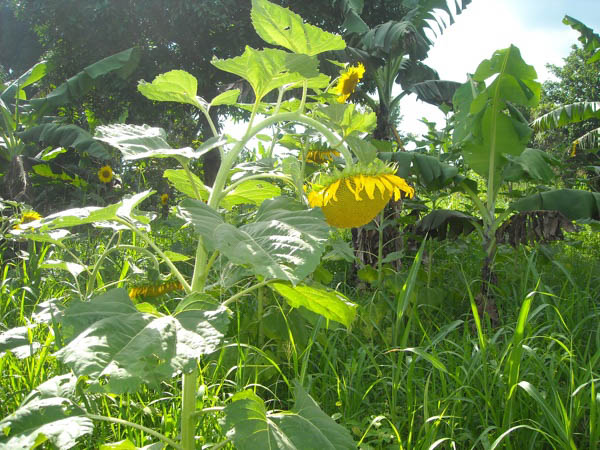
The main goal of this project is;" To boost farmers’ purchasing power so that they can sustainably manage their family challenges without having to wait for donor support".
Through this project BUVAD also expects to save some surplus to be able to timely address some of the immediate manageable community challenges and its administrative costs without having to wait for donor support all the time.
The project pilot farmer groups are continuing to grow and harvest a lot of sunflower.
The plan is that BUVAD would purchase this sunflower at favourable prices as compared to that set by the existent entrepreneurs so that BUVAD would process and sale off the end products at a normal surplus for the good of the farmers and sustainability of the project. The big huddle remains with securing grant to support towards the set up of a small scale industry as a start up.
Though the farmers are continuing to grow, they have been challenged by storage as the rodents (Mice) attack the over stored harvest seeds, eating them away very fast as it lies there in wait of purchase when BUVAD successfully sets up a universal purchase store and small scale industry for value addition towards earning added surplus.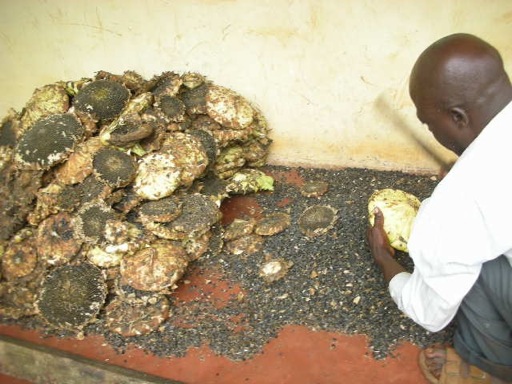
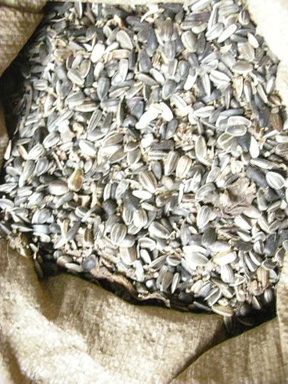
This has put a lot of stress on us as to how to save these farmers from losses and causing a fear of discouragement from a would be success story of poverty mitigation. Many a time the farmers have called reminding us to buy off their produce and this remains a big challenge as we do not have the funding right now to support this project. This is a potentially replicable project once a push forward is attained and would go very much far in mitigating 80% of the challenges encountered in most of our focal areas as the major source of income in most rural areas that make 90% of Kayunga District is Agriculture.
Upon this background, it would be our pleasure if some one or an organization came out and volunteered to partner with us or support towards this project in any way possible. We are ready to send a detailed project proposal to further explain this project.
Sunflower is a cash crop which can be mixed cropped with seasonal food crops for food security and is double seasoned with quite handsome money earning products and by-products.
On addition to the cooking oil extraction firm, we in future hope to set up a chicken feed mill, utilising the sunflower residues to make chicken feeds, which will enable community members to ably set up household poultry farms for poverty eradication.
How You Can Help:
Farmers have aggressively implemented this project by growing a lot of sunflower pending marketing. As regards the current entrepreneurs the pricing set by them is not favourable to farmers, a situation that has rendered them hesitant to sell off their sunflower harvest.
BUVAD in 2011 thought it wise and set up a company called “African Natural Sunflower Products Limited” (ANSUP Ltd) registered and certified by the Ugandan registrar of companies.
However ANSUP Ltd at the moment is in Limbo (Not yet taken off due to lack of start up capital) It’s objective is to purchase the farmers’ sunflower at a favourable price, process it and market the end product to earn not super normal but reasonable surplus, 5% of which could be donated to the parent organization BUVAD, to use it in the day to day administrative costs of the organization and charitable activities. This will begin after company take off and settlement of any outstanding debts to the company (ANSUP Ltd)
Company List of Equipment/requirements:
- - Purchase of a sizeable Industrial plot
- - The construction of the industry block and ware houses
- - Continued mobilization and monitoring of farmers to grow more sunflower with quality produce.
- - Purchase of the first set of sunflower seed processing mills for cooking oil extraction and packaging.
- - Installation costs of the oil extraction, packaging and branding machines.
- - Uganda National Bureau of Standards consultation fees
- - Insurance fees
- - Statutory fees/duties
- - Products marketing
- - Company vehicles (2 trucks)
- - Initial working capital
All initially estimated to consume a budget of USD176,073.
ANSUP LTD BUSINESS PLAN:
Company name:
The name of the Company is; African Natural Sunflower Products Limited (ANSUP Ltd)
Start up:
BUVAD management has assisted with the registration of the African Natural Sunflower
Products Company Limited (ANSUP Ltd) and is going to help in pioneering the
establishment of the company together with the company directors. This will involve;
construction of the machine and ware house, purchasing and installation of machinery,
continued community mobilization towards sunflower growing, recruitment of company
staff, monitoring and supervision.
N:B It will remain the sole responsibility of BUVAD to mobilize farmers throughout
Kayunga District and Uganda through networks in the neighbouring Districts like Soroti,
Kitgum, Gulu, Jinja, Mukono, Nakifuma, Buikwe and other interested ones to grow more sunflower.
A memorandum of understanding between ANSUP and BUVAD will be signed to ensure
that ANSUP will stick to the agreement of donating 5% of its surplus to BUVAD towards
helping BUVAD cover its administrative costs and charitable activities. The other 95%
will be used on company growth and shareholders’ dividends.
Shares:
Currently ANSUP has two main shareholders/promoters;
1. Mr. Stephen Ssemutumba holding 50%
2. Ms. Kevin Nanyonjo holding 50%
N:B The company Directors Kevin and Stephen as indicated in the company’s Articles of
Association and memorandum of understanding can mobilize more capital shares (Co –
investors) as they may deem necessary.
Company Status:
Not yet taken off due to lack of start up capital
Company Administration:
The company is expected to initially recruit 426 staff members whom will include;
1. The General Manager
2. The Assistant Manager.
3. The Human Resource manager
4. The Chief Finance Manager
5. The Production and Quality Assurance Manager
6. The Public Relations/Marketing Manager
7. 50 marketing officers
8. Office clerks
9. An office secretary
10. 50 Machine operators
11. 320 casual workers in the production unit.
Staff recruitment criteria:
The company staff shall specifically be qualified Ugandans most preferably residents of
Kayunga District. BUVAD will advertise jobs on behalf of the company to select
potential applicants for interview. The interview panel will assess the competence of each
candidate to select the best. Qualifying candidates at the interview panel will be recruited
on order of merit dependent on their competence for each of the above jobs.
Feasibility:
In the initial stage, the company shall extract cooking oil from the purchased sunflower
seeds from farmers. This cooking oil will be packed and branded for sale in the local
market. The sunflower cooking oil has a big local and international market potential due
to its cholesterol free nature an added advantage over its competitor cooking oil extracts
like from Simsim, cotton seed etc. It has a high market potential in all food joints,
restaurants and hotels. Already a market survey has been conducted through which also
potential customers have been approached to establish products market. Already a big
potential customer, The Sheraton Hotel Uganda has expressed interest in purchasing as
much as can satisfy its consumption quota of 60,000ltrs per week.
Also the sunflower residues after cooking oil extraction are going to be sold off for
preparing chicken feed and animal feeds. BUVAD in future expects to set up an animal
feed mixer and also extract other products from sunflower like; soap and cosmetics.
ANSUP Ltd also expects to exploit the international market potential through Fair trade
and the East African Common Market.
According to a feasibility study conducted ANSUP Ltd is expected to earn profit at a
profit margin of 16% per net worth sales of Euros76,800.
ANTICIPATED RESULTS and IMPACT:
- Improved purchasing power of not less than 294,613 people in te business focal areas to an average monthly income of Ushs 300,000 or US$150 (above) by 2017
- Widened revenue base for the business focal Districts by 2016
- More employment opportunities created in the business focal Districts.
- More than 426 new jobs created within the main project area.
- Improved standards of living for the people in the business focal areas due to boosted purchasing power.
- Greater practice of commercial agriculture especially sunflower growing within the business focal areas and Uganda as a whole.
- Farmers’ sunflower produce bought at a much more favourable price than that of the monopolizing entrepreneurs, due to proximity to a processing industry and better pricing approach by ANSUP Ltd in partnership with BUVAD.
- Replication of the sunflower seed crop production in the whole of Uganda due to the favourable pricing approach to farmers by ANSUP Ltd in partnership with BUVAD.
- Improved economic performance in the country due to a widened taxable base.
- Within one year of start up, sunflower oil and its bi-products will be one of the best selling items in the opened up East African Common market as it can locally be consumed by Hotels on a commercial basis, manufacturing industries, animal feed manufacturers, supermarkets and home consumptions.
LOCAL INITIATIVE:
Land:
The promoters have already identified a sizeable industrial plot of land with quick access to the 3 phase power line, for the industry/factory location in Bukolooto town in the industrial zone as stipulated by the town council.
Labour:
10% of the casual labour will be contributed by the community and volunteers, hence instead of the labour cost being 20% of the material cost will be reduced to 10% during construction of the machine house and warehouse.
Water:
At the site there is already a free water source, which provides increased proximity to water for the industry, hence this will further reduce on the overhead costs.
Staff technical input:
BUVAD staff initial technical input other than the ANSUP Ltd company employed staff will be voluntary work subject to no statutory payments apart from allowances until the end of the first year of output. Their responsibility will remain towards the BUVAD mission and goals.
SUSTAINABILITY/ CREDIT WORTHINESS:
ANSUP Ltd expects to acquire and set up the Sunflower-cooking factory as soon as possible. On acquisition of this factory, ANSUP Ltd will be in a position to buy off farmers’ produce at a favourable price of between Ushs1500 (US$0.5) to Ushs3000
(US$1) depending on the market going prices, process it, pack, brand the cooking oil and sell it off in marketable quantities of half litre, litre (above). Technical staff will be employed to price it at a price that will fetch normal revenue to ANSUP Ltd while at the convenience of the consumers. The profits earned will be used to cover production costs, set a provision for maintenance vote, provide for further extension of the program to more regions according to demand, plough back some profits for the required advancements in production, shareholders’ dividends, while saving some 10 % for donation to BUVAD for the company to pursue tax deductions while helping BUVAD to be able to carry on its non-profit project activities. According to the business plan, from each season ANSUP Ltd estimates gross profits of Ushs36.7 billion (US$18,350,000),
which will total up to Ushs73.4 billion (US$36,700,000) for the two seasons a year. An average net profits/surplus of Ushs6.117billion (US$ 3,059,000) shall be expected to be earned per month. This estimation is basing on an output from 150, 000 acres of land with a harvest capacity according to normal sunflower yield capacity of 600kgs per acre.
The Sunfora sunflower seed distributed to farmers has 40% oil content and to date a litre
of pure sunflower oil goes for between Ushs11,000 (US$5.5) and Ushs13,000 (US$6.5).
The project is expected to expand to a quite sizeable harvest just imagine involving
Kayunga District and neighbouring Districts (approximately 1/2 of Uganda).
Already farmers in Soroti District have via our website learnt about our project and collected seeds to which they have grown according to their season slightly different from that of Kayunga and we are expecting improved harvests.
The demand for sunflower oil and its residues used to make chicken feeds locally, surpasses the supply such that some of it still has to be imported from outside Uganda, which exhibits a great market potential that will favour an upcoming business like this one for the next 20(above) years.
The farmers/residents’ income per capita is expected to raise from Ushs 5,000 (US$2.5) to Ushs 300,000 (US$150) though this will be revised upwards depending on vigilance.
This will be an incentive for the farmers to continue growing sunflower supplying raw materials to the oil mill, which will in turn be able to sustainably continue to go on.
Farmers will royally continue to grow sunflower in order for them to maintain a steady income hence project sustainability.
We remain eager for your enthusiasm in this investment and empowering potential.
Please get in touch with us via our contact page for further discussions.
You can generously donate to support this project by clicking on the donate button or contact us for our banking details in case you wish to make a direct transfer to our organization account.
Orphaned Vulnerable Children (OVC) Care And Support Project:
Girl Child Educational Support:
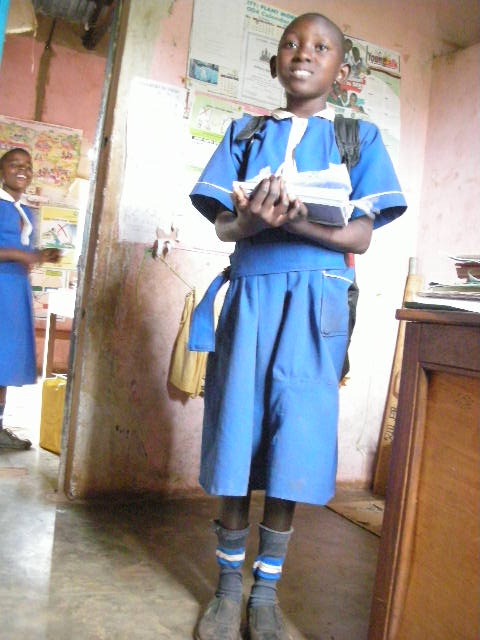
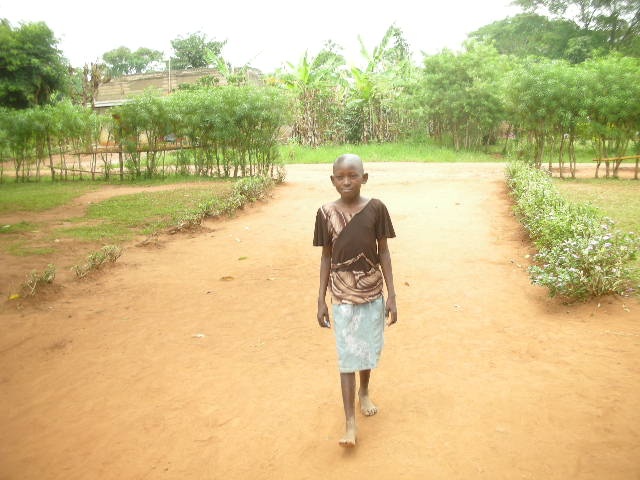
 BUVAD with support from girl child sponsors identified by IDC Empowers USA continues to sponsor fourteen orphaned girl children’s education. The main essence of this sponsorship is that each sponsor commits to give full support (School uniform, school supplies, shoes, lunch fees, examination fees etc) and sponsorship to the child until she finalizes as a graduate of a professional course most especially University level. 5 of these girl children have been at Primary School level, 7 are at Secondary School level, 1 is at certificate level offering Nursery teaching education course and 1 is at University Level.
BUVAD with support from girl child sponsors identified by IDC Empowers USA continues to sponsor fourteen orphaned girl children’s education. The main essence of this sponsorship is that each sponsor commits to give full support (School uniform, school supplies, shoes, lunch fees, examination fees etc) and sponsorship to the child until she finalizes as a graduate of a professional course most especially University level. 5 of these girl children have been at Primary School level, 7 are at Secondary School level, 1 is at certificate level offering Nursery teaching education course and 1 is at University Level.
Hopefully more sponsors will come out to join our initiative as more orphaned girl children are crying for this sponsorship. If you are a potential child sponsor and wish to support a girl child please kindly get in touch with us or you can click on the sponsor a girl button to directly surf to make a choice of the BUVAD identified girl you wish to sponsor.
School Supplies Support to Needy Children:
BUVAD has annually supported children of Bwetyaaba Primary school with school supplies and its our desire to support more of these kind of community primary schools that have approached us for similar support despite our meagre resources. Its our humble prayer and we do call upon more partners to come in and join hands with us to realise this wonderful commitment.
BUVAD has been able to donate school bags, exercise books, shoes, school uniforms and thunder arrestor gadgets to Bwetyaaba Primary school on behalf of our partners, GBP USA.
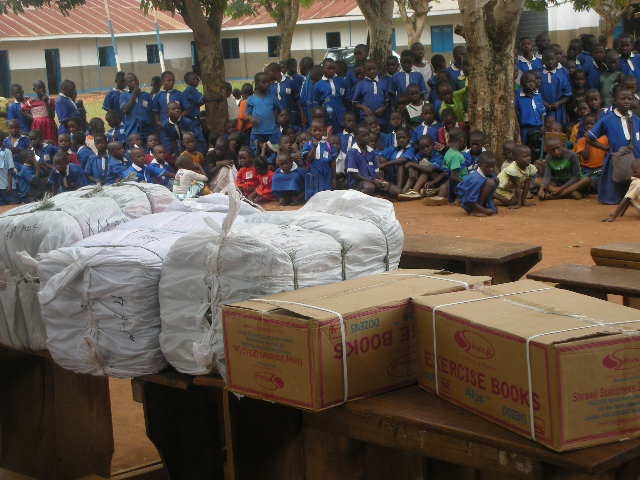
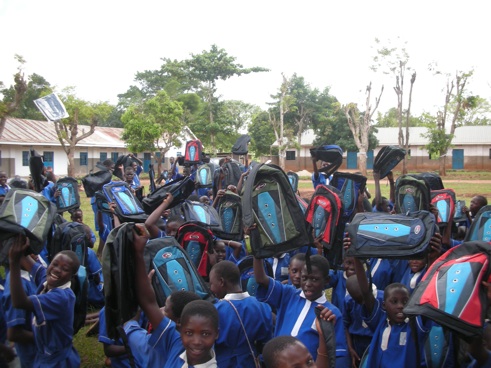
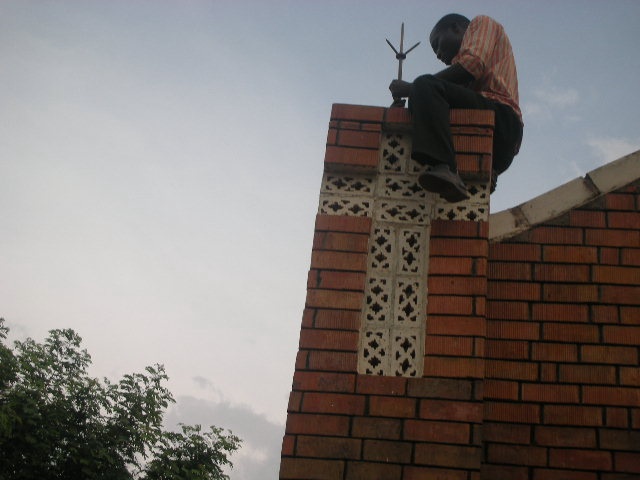
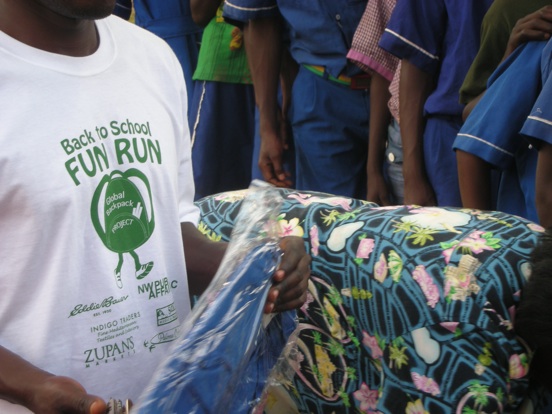
We wish GBP USA every success in their continued effort to sustainably meet the target of helping out a total of 670 children in this school.
It is our target that we can do this for the rest of Kayunga District for an estimate total of 2500 Orphaned Vulnerable Children in the schools of Kayunga Mixed Primary school, Busaale Primary school, Bubajjwe primary school and Ndeeba Primary school.
Upon this background we wish to call upon all those child focused philanthropic organizations and well-wishers to come out and help us support this great cause.
We desire to install thunder arrestors at many more schools in the District as long as funding is available and we call upon sponsors to get in touch with us if they are touched by this need. We are targeting schools since they are among the biggest collection centres for children daily, weekly and annually for longer hours and many times the rains that come along with thunder storms find these children at school.
The Get Together Women Development Initiative Coop
BUVAD continues with the Women Micro - loan support towards the women development coop. A women group named “Get Together Women’s Development Initiative” was created with a pioneer number of 13 women beneficiaries. More women members have joined in and received small quite low interest loans that they use to boost their income generating activities like; making mats, baskets, beer brewing and vending, operating small kiosks, retails shops, rearing chicken, rearing pigs, sunflower growing, grafted fruits tree seedlings varieties purchase to grow in their gardens and other cash crops growing.
Crafts available for sale Women meeting session
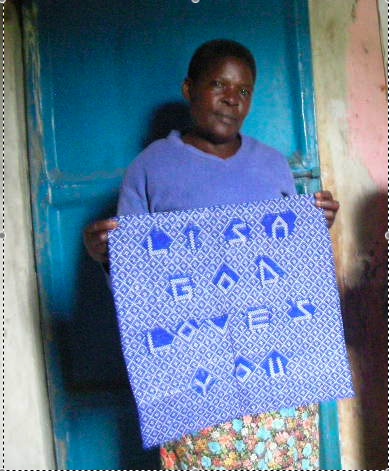
The main goal of this project is to empower women boost their household incomes as the mothers in the houses and key custodians of homes.
Women have had a chance to export a few of their crafts with sponsorship from IDC Empowers through BUVAD.
Women have been holding regular meetings together with educational tours to each others’ projects, sharing about their projects’ performance and how they could be advanced. A proposal on advancement of their projects has been designed for upcoming years implementation and their input in designing this proposal has been of great significance.
Women planting tree seedlings of oranges, mangoes, macadamia, etc
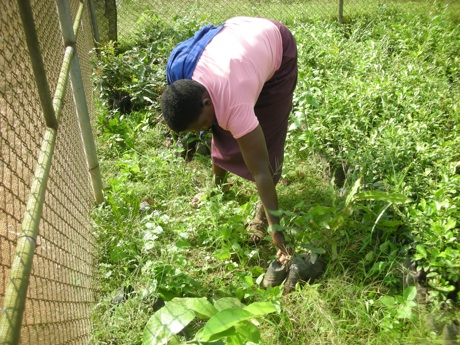
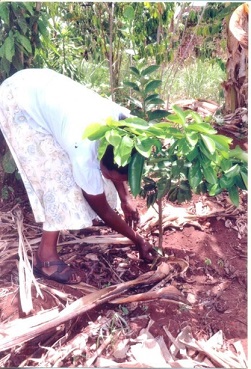
How You Can Help:
You can help by supporting these women by contacting us or by donating click on the donate button or by physically coming in as a volunteer to add new skills to them. See the about us page for details on volunteering at BUVAD.
Networking And Partnership With Related Agencies
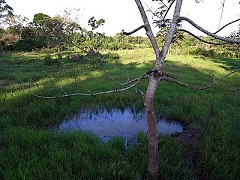
One of the key BUVAD strategies is to improve on it’s performance and service delivery. Upon this background, BUVAD has laid down in its strategic plan, continued to widen its partner and network base.
BUVAD is now a member of the Uganda Water partnership and Global Water Partnership too. We are also members to the Uganda Water and Sanitation Network (UWASNET). BUVAD is also a member to the Kayunga District Water and Sanitation Coordination Committee whose objective is to plan together with all stake holders within the water development department to avoid duplication of resources, equally distribute resources and avoid under serving other disadvantaged areas.
BUVAD on addition to its already existent partners, is open to more both local and international partners. Feel free to join us
BUVAD will continue to link up with partner agencies and will widen its partner base as far as there are those that are willing to join us from around the world.
Please follow us on facebook at our face book group page http://www.facebook.com/groups/buvad2000/
